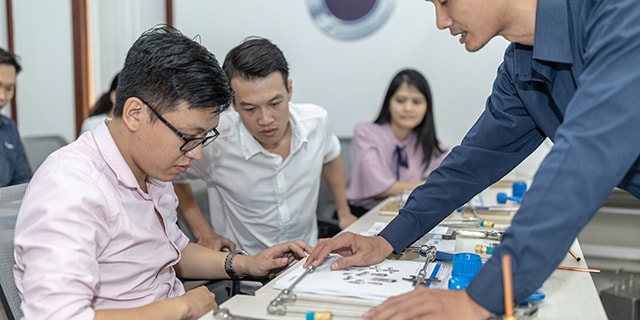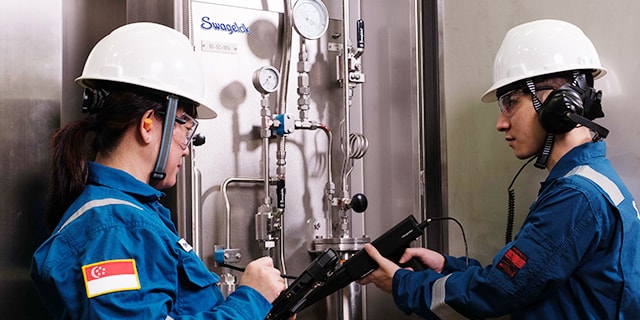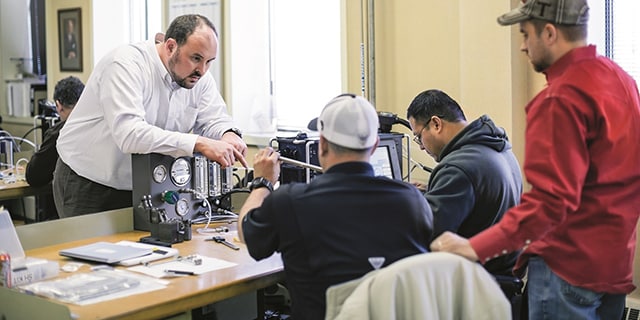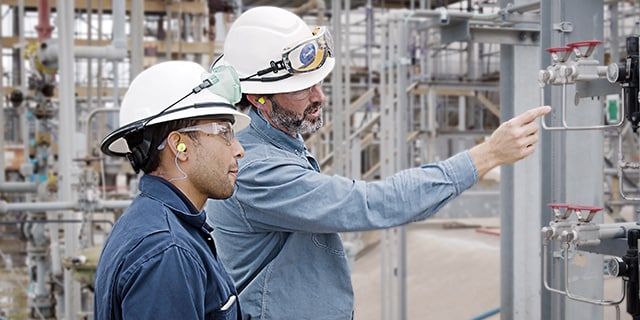Fluid System Training: Is Your Trainer Trained?

Fluid System Training: Is Your Trainer Trained?
Brian Van Valkenburg, Training & Services Marketing Manager
There are many variables that go into safe and successful industrial fluid system operation. It takes the right knowledge to install components correctly throughout the system, the right materials science expertise to select and specify the proper alloys to match the needs of your processes, and the right sampling proficiency to evaluate and analyze a process stream.
Each of those variables require knowledge and skills—and in today’s industry, those traits are not always easy to come by. Between large-scale retirement and dwindling technical staffs, industrial fluid system operators are tasked with maintaining safe and reliable operation despite some critical gaps that may exist in staff knowledge. At the same time, global industry is expanding with new fluid and gas systems coming online in new and emerging markets. In these cases, a tenured technician has not just walked out the door to retirement taking decades of expertise with him—that knowledge has never existed in the first place.
These circumstances mean that across the oil and gas, chemical and refining, and other industries where safe fluid system operation is critical, proper training is more important than ever before. Being successful operating a new oil rig, for example, depends on trained staff that knows how to build and maintain all critical fluid systems that go along with it. For operators, evaluating available oil and gas training and refining training courses could be a worthwhile investment.
A well-trained staff leads to higher plant safety, minimized downtime, and greater overall profitability. If you are considering investing in staff training at your plant, here are a few things to keep in mind:
Training: the transfer and application of knowledge. Training should result in more than trainees simply retaining a set of information—it is about being able to apply knowledge to critical situations across plant operations.
The most successful training programs make application their core goal. For example, knowing the chemistry and characteristics of different metal alloys is important, but what does that information mean on the plant floor? Your team’s ability to translate new information to real-world applications is the most important success metric of a training program. Knowing why corrosion occurs is one thing—a technician’s ability to solve a corrosion issue based on that knowledge is another.
For that reason, when evaluating potential training programs, it is a good rule of thumb to seek out training professionals who have a wealth of real-world, in-plant experience. They should be familiar with the scenarios your staff is facing every day. They should be able to include both theoretical and practical training exercises. Trainers who can take their own firsthand, real-world experience and engage your staff with relatable stories will often be the most successful.
Specific, localized subject matter and support. The most successful training programs do not paint with a broad brush—they are based on the needs and challenges that your facility faces every day. A large part of that depends on the trainer’s ability to understand local circumstances, regulations, and other geographic-specific factors that impact your facility. Regulations that govern oil and gas activity in the Northern United Kingdom, for example, are different from those in the Gulf of Mexico.
Regional specificity for training may also include the general level of knowledge among local workforces. For instance, Swagelok’s Malaysia sales and service center does a significant amount of business within the Malaysia, Indonesia, Singapore, and Thailand markets, where a thriving yet still emerging oil and gas market is beginning to take shape. Through this experience, we know there is a strong appetite for materials science and corrosion training—highly important to high-stakes oil and gas operations. Our teams have had the opportunity to provide tailored metallurgy and materials science training to help elevate the knowledge of industry stakeholders for greater success. Other markets, and other specific plant applications, may have different needs. Our teams additionally held a lunch and learn session with a key customer to answer some specific questions about dual-certified 316/316L alloys.
The bottom line for any operation considering training opportunities is that localized service and localized expertise can be a real difference-maker, focused on relevant needs and challenges to your operations.
Trained trainers. Swagelok understands the critical nature of robust, proper training on the essentials of fluid systems in today’s industry. It is why our training structure ensures that each global distributorship offering training opportunities to their regional customers has gone through a rigorous training process of their own. It is how Swagelok ensures consistent, high-quality training around the world, while remaining able to narrow in on specific market needs everywhere we operate.
At the end of the day, we ensure Swagelok training experts go through a rigorous process. Our highest priority is to help our customers accomplish their goals. We want them to feel confident that their system is operating not just adequately, but the best it can possibly be. Training ensures your staff can select and install the most appropriate componentry accurately and reliably. By eliminating these kinds of maintenance and safety concerns, operators can focus on what they do best—delivering quality products and maximizing profitability for the organization.
Want to learn more about available training opportunities from Swagelok? Contact us today to learn more about our full suite of training courses.
Related Articles

Four Ways Training and Advisory Services Can Help You Bridge the Skills Gap
Learn how fluid system training and advisory services can help operators bridge a growing skills gap across several industries.

Closing the Manufacturing Skills Gap: Develop a Well-Trained Team
With an aging industrial workforce nearing retirement, manufacturers are turning to younger generations to replace expert knowledge. Learn how to build an effective fluid system training program with expert advice from Swagelok.

How to Improve Fluid System Performance
When fluid systems fail to perform safely and efficiently, plant productivity suffers. Swagelok can relieve the pressure of maintaining good system performance by providing expert guidance and helping to create a culture of continuous improvement.

